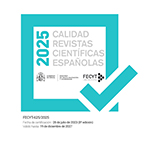Revolución educativa y teoría político-pedagógica en Paulo Freire
Resumen
Paulo Freire ha sido reconocido como uno de los pedagogos más importantes del siglo XX, sin embargo, su obra va más allá de la pedagogía en diversos aspectos. La vinculación de sus textos con situaciones políticas de transición o de transformación en diversos lugares del mundo como Pernambuco, Brasil o Guinea-Bisáu, antigua colonia de Portugal en África, nos hacen notar una transversalidad de su teoría que bascula hacia la filosofía política y la sociología. En este artículo se constata cómo en las obras de Paulo Freire redactadas como procesos político-pedagógicos y biográficos, se encuentra un esquema organizacional del poder y de la participación de las poblaciones en las tomas de decisión frente a problemáticas sociales. Para ello se partirá de su circunstancia en Brasil, como mapa donde incardinar la obra de Freire, y de ahí se pasará a la teorización de uno de sus textos más visibles como es Pedagogía del Oprimido. En esta obra, fruto de tales circunstancias, nuestro autor establece un paralelismo entre la teoría educativa y la política. En ella también encontramos una reflexión sobre sujetos que renuevan premisas de la teoría tradicional política y que establecen el campo de aprendizaje de nuevo en forma de dialéctica.
Descargas
Descarga artículo
Licencia
La revista Las Torres de Lucca. International Journal of Political Philosophy, para fomentar el intercambio global del conocimiento, facilita el acceso sin restricciones a sus contenidos desde el momento de su publicación en la presente edición electrónica, y por eso es una revista de acceso abierto. Los originales publicados en esta revista son propiedad de la Universidad Complutense de Madrid y es obligatorio citar su procedencia en cualquier reproducción total o parcial. Todos los contenidos se distribuyen bajo una licencia de uso y distribución Creative Commons Reconocimiento 4.0 (CC BY 4.0). Esta circunstancia ha de hacerse constar expresamente de esta forma cuando sea necesario. Puede consultar la versión informativa y el texto legal de la licencia.









